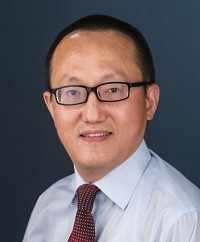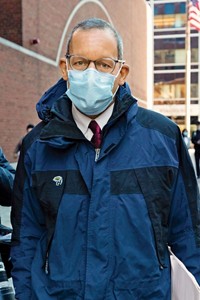Advertisement
Grab your lab coat. Let's get started
Welcome!
Welcome!
Create an account below to get 6 C&EN articles per month, receive newsletters and more - all free.
It seems this is your first time logging in online. Please enter the following information to continue.
As an ACS member you automatically get access to this site. All we need is few more details to create your reading experience.
Not you? Sign in with a different account.
Not you? Sign in with a different account.
ERROR 1
ERROR 1
ERROR 2
ERROR 2
ERROR 2
ERROR 2
ERROR 2
Password and Confirm password must match.
If you have an ACS member number, please enter it here so we can link this account to your membership. (optional)
ERROR 2
ACS values your privacy. By submitting your information, you are gaining access to C&EN and subscribing to our weekly newsletter. We use the information you provide to make your reading experience better, and we will never sell your data to third party members.
Research Integrity
Chemist Feng ‘Franklin’ Tao convicted of fraud over China interactions
University of Kansas chemical engineering professor was charged with wire fraud and making false statements
by Ariana Remmel
April 16, 2022
| A version of this story appeared in
Volume 100, Issue 13

A jury on April 7, 2022, found chemist Feng “Franklin” Tao guilty of wire fraud and making false statements. The verdict came after over 2 years of investigations into whether Tao had not disclosed research ties to a university in China while conducting federally funded research as a chemical engineering professor at the University of Kansas (KU) in Lawrence.
Tao was charged with six counts of wire fraud and two counts of making false statements under the US Department of Justice’s China Initiative, a controversial program intended to target economic espionage. Although the DOJ has revamped the program, it did not drop existing cases. Tao’s trial began March 21, 2022, at the Robert J. Dole US Courthouse in Kansas City, Kansas.
Assistant US Attorney Chris Oakley and Trial Attorney Adam Barry presented the government’s evidence, which included emails, recorded conversations, and official documents obtained by the Federal Bureau of Investigation. Prosecutors alleged that Tao had begun working for Fuzhou University (FZU) in Fujian, China, in May 2018 without disclosing this potential conflict of interest to his employers at KU or the US agencies that supported his research, the Department of Energy (DOE) and the National Science Foundation (NSF).
The prosecution argued that records of his communications show that Tao neglected his duties to KU and federal agencies while promoting his career with Chinese research institutions. They claimed that Tao knowingly lied about his affiliation with FZU, that he concealed information about his job negotiations, and that he deceived KU and federal agencies by failing to disclose pending financial support from funders in China and the competing interests that interfered with his ability to perform his duties as a KU faculty member.
“The defendant knew he was committing a crime,” Oakley said in closing arguments. Prosecutors did not present evidence that Tao was paid by FZU or China in closing arguments.
Defense attorneys Peter Zeidenberg and Michael Dearington of ArentFox Schiff described the case as a “fundamental misunderstanding by the government about how [federal research] grants worked.”
Witnesses for the defense testified that Tao was a hardworking, high-achieving researcher. Zeidenberg repeatedly referred to testimony by prosecution witnesses from the NSF and DOE who stated that the agencies were “happy” with the research Tao performed with federal grants. Zeidenberg also emphasized that KU—not Tao himself—received almost all the money obtained through those grants.
Tao’s defense team argued that the government’s case revolved around his alleged failure to disclose a conflict of interest in employment paperwork at KU—an action Zeidenberg said does not warrant a federal trial.
After a day and a half of deliberation, the jury found Tao guilty of three counts of wire fraud and one count of making false statements.
Tao appeared surprised and disheartened by the verdict. “We are disappointed but confident we will prevail in the end,” Zeidenberg told C&EN. He maintains Tao’s innocence, saying that the government’s evidence did not support the charges that his client intended to commit fraud or that any party was defrauded.
Judge Julie Robinson did not set a sentencing date. She instead requested that the defense file additional documents, and she detailed a timeline that suggests this date could be set in the coming months. Tao cannot appeal until the judge upholds the verdict and hands down a sentence.

A spokesperson for the Department of Justice declined to comment on the verdict beyond a news release. “Tao faces up to 20 years in federal prison and a fine up to $250,000 for wire fraud, and up to 10 years and a fine up to $250,000 on each of the program fraud counts,” the release states.
Erinn Barcomb-Peterson, a KU spokesperson, declined to comment on the verdict, stating in an email that “separate from the criminal trial, this issue remains a personnel matter.”
Haipei Shue, the current president of the social justice nonprofit United Chinese Americans, was among Tao’s supporters in the courtroom during the final days of the trial. Shue said he was “very, very disappointed” and sees Tao’s case as part of a concerning series of litigations that have disproportionately targeted Chinese Americans. With the sentencing date not yet set, Shue believes Tao “still has a fighting chance to get justice.”
Under questioning by Zeidenberg, FBI special agent Stephen Lampe testified that the agency began investigating Tao after a former scientist in his lab, Huimin Liu, told the FBI that Tao was a “tech spy” who was hiding a researcher award from the Chinese government as well as a faculty position with FZU. As proof, Liu provided agents with a draft of an unsigned employment contract between Tao and FZU. Further investigation revealed that Liu had made multiple accusations against Tao under different names, had attempted to extort him for about $300,000, and had lied to federal agents about how she obtained the unsigned contract. Lampe testified that he found Liu a credible witness even though she was “angry” about an academic dispute with Tao.
Tao was never charged with espionage, and the judge excluded expert testimony that “risks misleading the jury into thinking this case is actually an economic espionage or theft of trade secrets case,” according to Kansas City National Public Radio station KCUR. Tao’s internal KU emails counted as federal wire fraud because the university’s servers were in Illinois rather than Kansas.
Tao was released by the court after the verdict and has returned to his home in Lawrence, Kansas, according to Tao’s wife, Hong Peng, and his lawyer.





Join the conversation
Contact the reporter
Submit a Letter to the Editor for publication
Engage with us on Twitter